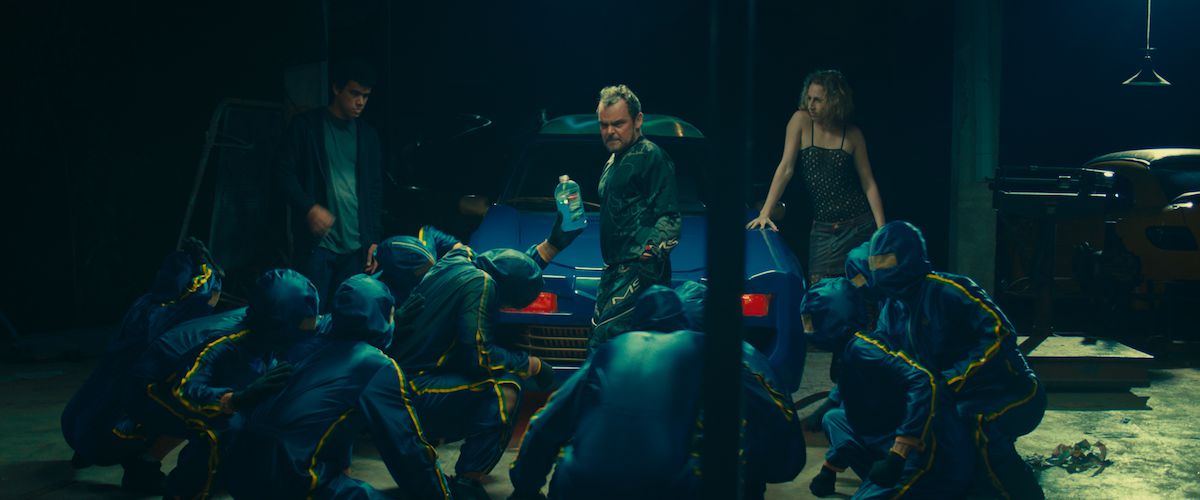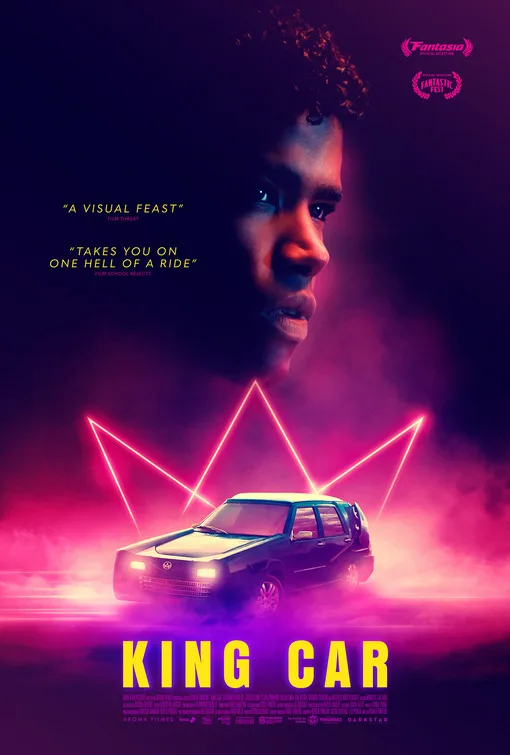The unexpectedly funny Brazilian horror comedy “King Car” comes to America with two strikes against it. For starters, “King Car” will be released during the first weekend in January, so adventurous/curious viewers might not be looking forward to a dark satire about a sentient, megalomaniacal car. It’s also hard to talk up “King Car” without acknowledging up front that yes, this is the other 2021 genre hybrid where a human protagonist has sex with a car. “Titane” may have won the Palme D’Or last year, but “King Car” was mostly a word-of-mouth hit among film festival attendees. “Titane” was a cause celebre, but “King Car”? Who knows what that is, let alone how to sell it?
Written and directed by Renata Pinheiro (and co-written by Sergio Oliveira and Leo Pyrata), “King Car” mostly concerns teenage car buff Uno (Luciano Pedro Jr.) and his relationship with the title character, a talking car (voiced by Tavinho Teixeira). Uno and King Car share an unusual relationship, as you might expect: Pedro’s character refurbishes (and gives a literal voice-box to) King Car after a new local law prohibits Pernambucan motorists from driving any car that’s more than 30 years old. A pre-restoration King Car also used to telepathically—and exclusively—communicate with Uno (played by young Alexandre Lima in early scenes). And in an establishing scene, King Car also saves Uno from a life-threatening vehicular accident; unfortunately, King’s intervention inadvertently results in the death of Marileide (Ane Oliva), Uno’s biological mom.
You might be wondering: is “King Car” one of those movies where a talking car and his human companion inevitably clash because, as in “Christine,” they have an unhealthy parasitic relationship? Yes and no. Like David Cronenberg’s earlier features, “King Car” is most enjoyable when its creators are developing their movie’s world and not its story. Because “King Car” eventually stops being about Uno and King Car’s relationship and, through a series of loosely connected narrative episodes, starts concerning various supporting characters.
There are some familiar romantic and domestic power dynamics throughout. Uno looks up to his reclusive inventor/mechanic uncle Zé (Matheus Nachtergaele), and therefore inevitably clashes with love interest Clara (Pinheiro), a young agro-ecology student who doesn’t understand Uno’s fascination with King Car. Meanwhile, Zé not only helps to re-build cars, but also co-leads a cultish group that’s managed by Zé, but is really organized by the insidious and obviously insecure King Car. Pinheiro and her two co-writers deserve credit for making their characters both compelling and engaging throughout, especially whenever their movie switches gears from a high-concept programmer to a broader satire that suggests political trends—even a gearhead revolt led by a talking car—often look smaller and more ridiculous once you know their underlying social/inter-personal causes.
“King Car” is and isn’t the sort of pop art provocation that boils down to its figurehead image: somehow, King Car has sex with Mercedes (Jules Elting), Zé’s girlfriend. As she’s stimulated off-camera, Mercedes’ pleasure is emphasized through a series of overlapping close-ups of Elting’s face, front-lit by the trippy rainbow lights of King Car’s mattress-like canopy. There’s also some welcome post-coital dialogue: King Car asks Mercedes, a feminist conceptual artist, if that was her first time, too. She laughs; it wasn’t. He clarifies: was that her first time with a machine? More laughter; also, no. Mercedes then tries to reassure her mechanical lover—such “potency”!—but by this point, the scene is clearly not just about messing around with a car—“King Car” also makes time for pillow talk.
It’s tempting to say that Pinheiro and her co-creators have made a movie that was always bound to be limited by its more gonzo conceits and metaphors. This is, after all, a movie where several young people are mysteriously brainwashed by a car after they huff and then drink a phosphorus-infused motor oil (it doesn’t make much more sense in context). Then again, “King Car” is also generally more composed and thoughtful than you might expect: cinematographer Fernando Lockett’s particular emphasis on wide blocking and dark surface colors (especially metallic blues and turquoise greens) often makes you feel like you’re seeing the world through a tinted windshield.
“King Car” may leave viewers wondering about a number of basic questions (mostly related to the plot), but it also often feels open and precise enough to work on its own terms. Everything you need to know about “King Car” is in the movie, and while that may sound like a dare, this really is the sort of film that should be seen and appreciated for what it is, and not whatever it’s being sold as.
Now playing in theaters and available on VOD and digital platforms.




















